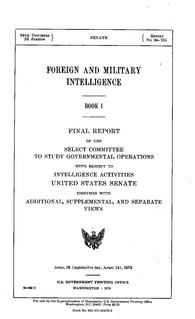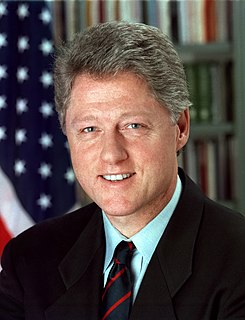
Operation Northwoods was a proposed, and almost implemented, false flag operation against the Cuban government that originated within the U.S. Department of Defense (DoD) and the Joint Chiefs of Staff (JCS) of the United States government in 1962. The proposals called for the Central Intelligence Agency (CIA) or other U.S. government operatives to commit acts of terrorism against American civilians and military targets, blaming them on the Cuban government, and using it to justify a war against Cuba. The plans detailed in the document included the possible assassination of Cuban émigrés, sinking boats of Cuban refugees on the high seas, hijacking planes, blowing up a U.S. ship, and orchestrating violent terrorism in U.S. cities. The proposals were rejected by John F. Kennedy.

The President's Daily Brief (PDB), sometimes referred to as the President's Daily Briefing or the President's Daily Bulletin, is a top-secret document produced and given each morning to the President of the United States, and is also distributed to a small number of top-level US officials who are approved by the President, and includes highly classified intelligence analysis, information about covert operations of the US Central Intelligence Agency (CIA) and reports from the most sensitive US sources or those shared by allied intelligence agencies. The PDB is also provided to the President-elect of the United States, between election day and inauguration.
Declassification is the process of documents that used to be classified as secret ceasing to be so restricted, often under the principle of freedom of information. Procedures for declassification vary by country. Papers may be withheld without being classified as secret, and eventually made available.
The Joint Inquiry into Intelligence Community Activities before and after the Terrorist Attacks of September 11, 2001 is the official name of the inquiry conducted by the Senate Select Committee on Intelligence and the House Permanent Select Committee on Intelligence into the activities of the U.S. Intelligence Community in connection with the September 11, 2001 attacks. The investigation began in February 2002 and the final report was released in December 2002.

The Puzzle Palace is a book written by James Bamford and published in 1982. It is the first major, popular work devoted entirely to the history and workings of the National Security Agency (NSA), a United States intelligence organization. The title refers to a nickname for the NSA, which is headquartered in Fort Meade, Maryland. In addition to describing the role of the NSA and explaining how it was organized, the book exposed details of a massive eavesdropping operation called Operation Shamrock. According to security expert Bruce Schneier, the book was popular within the NSA itself, as "the agency's secrecy prevents its employees from knowing much about their own history".

A black operation is a covert or clandestine operation by a government agency, a military unit or a paramilitary organization. This can include activities by private companies or groups. Key features of a black operation are that it is secret and it is not attributable to the organization carrying it out. The main difference between a black operation and one that is merely secret is that a black operation involves a significant degree of deception, to conceal who is behind it or to make it appear that some other entity is responsible.

The Church Committee,, a U.S. Senate select committee chaired by Idaho Senator Frank Church (D-ID) in 1975. The committee investigated abuses by the Central Intelligence Agency (CIA), National Security Agency (NSA), Federal Bureau of Investigation (FBI), and the Internal Revenue Service (IRS). The committee was part of a series of investigations into intelligence abuses in 1975, dubbed the "Year of Intelligence", including its House counterpart, the Pike Committee, and the presidential Rockefeller Commission. The committee's efforts led to the establishment of the permanent U.S. Senate Select Committee on Intelligence.

James Bamford is an American bestselling author, journalist and documentary producer widely noted for his writing about United States intelligence agencies, especially the National Security Agency (NSA). The New York Times has called him "the nation's premier journalist on the subject of the National Security Agency" and in a lengthy profile The New Yorker named him "the NSA's chief chronicler." Bamford has taught at the University of California, Berkeley as a distinguished visiting professor and has written for The New York Times Magazine, The Atlantic, Harper's, and many other publications. In 2006, he won the National Magazine Award for Reporting, the highest award in the magazine industry, for his writing on the war in Iraq published in Rolling Stone. He is also an Emmy nominated documentary producer for PBS and spent a decade as the Washington investigative producer for ABC's World News Tonight. In 2015 he became the national security columnist for Foreign Policy Magazine and he also writes for The New Republic. His most recent book, The Shadow Factory: The Ultra-Secret NSA From 9/11 to the Eavesdropping on America, became a New York Times bestseller and was named by The Washington Post as one of "The Best Books of the Year." It is the third in a trilogy by Bamford on the NSA, following The Puzzle Palace (1982) and Body of Secrets (2001), also New York Times bestsellers.
The Commission on Protecting and Reducing Government Secrecy, also called the Moynihan Commission, after its chairman, U.S. Senator Daniel Patrick Moynihan, was a bipartisan statutory commission in the United States. It was created under Title IX of the Foreign Relations Authorization Act for Fiscal Years 1994 and 1995 to conduct "an investigation into all matters in any way related to any legislation, executive order, regulation, practice, or procedure relating to classified information or granting security clearances" and to submit a final report with recommendations. The Commission's investigation of government secrecy was the first authorized by statute since the Wright Commission on Government Security issued its report in 1957.
The United States government classification system is established under Executive Order 13526, the latest in a long series of executive orders on the topic. Issued by President Barack Obama in 2009, Executive Order 13526 replaced earlier executive orders on the topic and modified the regulations codified to 32 C.F.R. 2001. It lays out the system of classification, declassification, and handling of national security information generated by the U.S. government and its employees and contractors, as well as information received from other governments.
The Interagency Security Classification Appeals Panel, or "ISCAP", provides the public and users of the classification system with a forum for further review of classification decisions. ISCAP states in order to foster a well-informed public while simultaneously protecting national security interests, checks and balances are needed over the classification system. This requires that some of the work of the U.S. Government be done outside the purview of its citizenry.
The Public Interest Declassification Board (PIDB) is an advisory committee established by the United States Congress with the official mandate of promoting the fullest possible public access to a thorough, accurate, and reliable documentary record of significant U.S. national security decisions and activities. The Board is composed of nine individuals: five appointed by the President of the United States and one each appointed by the Speaker of the House, House Minority Leader, Senate Majority Leader, and Senate Minority Leader. Appointees must be U.S. citizens preeminent in the fields of history, national security, foreign policy, intelligence policy, social science, law, or archives.
J. William Leonard was appointed the new Director of the Information Security Oversight Office (ISOO) effective on Monday, June 3, 2002.
Executive Order 13526 was issued on December 29, 2009 by United States President Barack Obama. It is one of a series of executive orders from US Presidents outlining how classified information should be handled. It revokes and replaces the previous Executive Orders in effect for this, which were EO 12958 (text) and EO 13292 (text).












